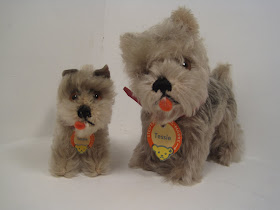Imagine if a big part of your profession included hanging out with, cataloging, and selling delightful vintage Steiff collectibles. For many of us, that would just be a dream job! Please meet Carsten Esser, who spends his days doing just that. Carsten is the Managing Director and Auctioneer at Teddy Dorado, an auction house in Germany that specializes in the treasures we all love. He agreed to speak with us about his company, love of Steiff, and the upcoming auction at the annual "Steiff Sommer" Festival in July.
Steiffgal: Thanks so much for talking with us today. Can you tell us a little about yourself?
Carsten: Sure! I live in Wachtberg, Germany which is in the Cologne-Bonn area of Germany, and near the Rhine River. I studied economics and business at a university quite near the Steiff factory in Giengen. I just turned 40 years old this month. On my special day I had the pleasure of spending time at the Steiff Company, working on the selections for The Giengen Steiff Auction, which is one of the highlights of the company's annual summer event. This year, the auction will be held on July 2nd, 2011.
Steiffgal: Are you personally a Steiff collector?
Carsten: Oh yes! I have been interested in Steiff my entire life and have a large personal collection. Even as a child I would attend toy fairs in Germany as a dealer and buy and sell Steiff. In the 1980's I started collecting old catalogs and other Steiff ephemera, although the toys have always been the most special to me. So I am very lucky that I do what I love, and love what I do!
Steiffgal: Please tell us about Teddy Dorado. What is the history and story behind your company?
Carsten: For many years, I bought and sold vintage Steiff items on eBay. I liked to see all the listings and photos, but was frustrated that every seller had their own way of presenting items and that there were no standard terms and metrics to describe the condition of items. So I came up with the idea of running auctions just for Steiff items. The goal was to have a well organized marketplace with clear categories, plenty of good pictures and precise descriptions. I thought this would be interesting for Steiff collectors worldwide, and I think I was right. So Teddy Dorado was born!
In August, 2010 we started our company website. We held our first two auctions in October 2010 and then again in April 2011. Our company has a core team of three employees, but during special events, our staff grows to about 25 people to help support all the logistics and tasks that come with our worldwide auctions. You can see our building which is pictured above.
Steiffgal: Tell us about the name of your company. What does it mean, and how did you come up with it?
Carsten: The name is based on the idea of an "El Dorado" - or city of gold - for Teddy bear collectors. Our company aims to be worldwide marketplace where stuffed toys and Teddy bears are traded in a very efficient way.
Steiffgal: Tell us about the upcoming Steiff auction which will be held as part of Steiff's annual summer celebration. How did you get involved with this event?
Carsten: Teddy Dorado was only recently contacted by the Steiff management team about hosting the upcoming auction during the company's upcoming "Steiff Summer 2011". I think they asked us to participate because they liked our printed auction catalogs, the quality of our website, and how we ran our past auctions in our salesroom.
The auction will be held on July 2nd, 2011. 133 extraordinary Steiff toys will be sold. These include prewar Teddy bears, cats, and dogs; many uncataloged plush items; historical documents and photographs from the company; and even a painting that once hung in Margarete Steiff's living room!
As for the auction logistics, worldwide bids will be accepted, and the buyer's premium will be 16% of the hammer price. The printed catalog is 232 pages and includes a reprint of the Steiff 1930 Jubilee Publication. All the auction lots, and more details about the auction and catalog, - including downloadable bidding forms - can be found at our website, www.teddydorado.com.
Steiffgal: Two final questions. In your opinion, what is the most special item in the auction? Personally, what is your favorite lot in the auction?
Carsten: That's really hard to say as there are so many absolutely stunning Steiff toys in the auction. A very special item is a 105 year old "Humpty Dumpty", or what we call "Man from Mars" or "Egg Head" here in Germany. He is in like new condition; his felt is blemish free, his face painting is perfect, and his felt clothing is still vibrantly colored. You can see him here on the left.
Personally, I am drawn to a white Teddy bear from the late 1920s. He is in mint condition and even retains his red ear tag. It is even more dear to me as it comes from a brilliant private collection of a collector to whom I spoke about my idea about a specialty auction house before founding Teddy Dorado.
Steiffgal: That sounds really exciting! Thank you so much for your time and for helping Steiff collectors all over the world share in these remarkable rarities!
Have a question about one of your Steiff treasures? Let's talk! Click here to learn more.
















